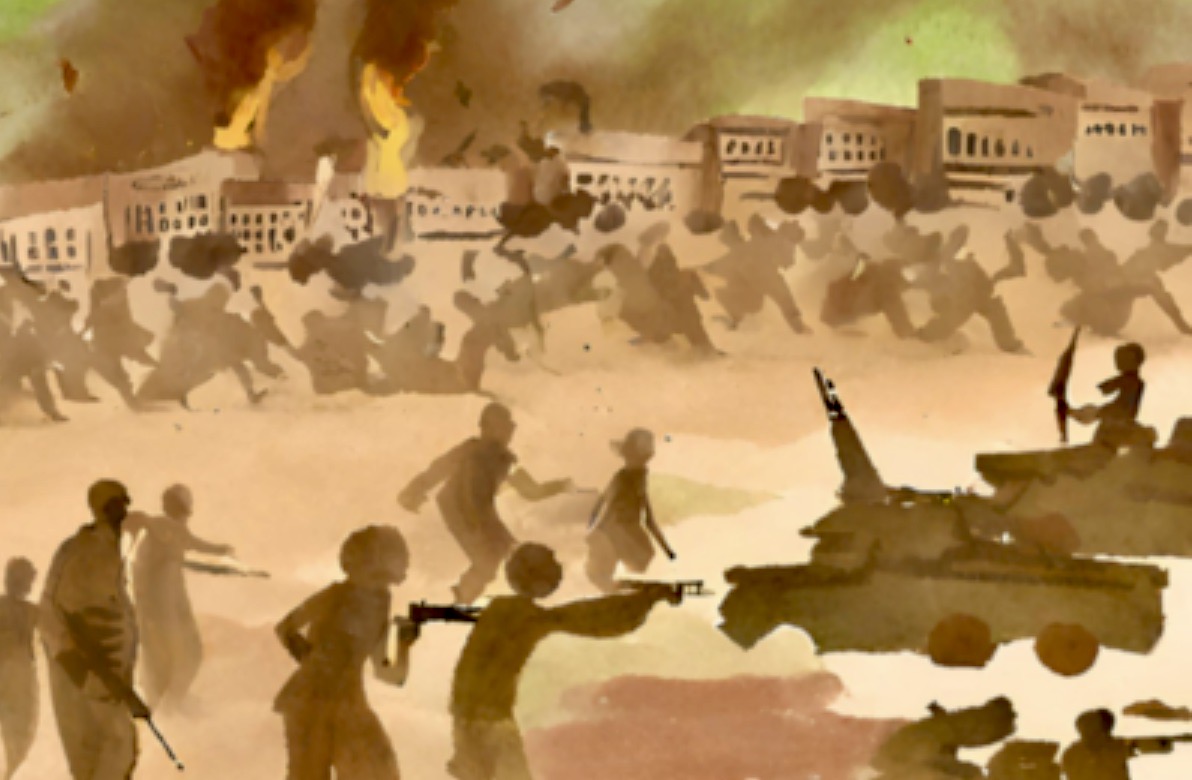Sudan Conflict Monitor #8
14 December 2023
The Sudan Conflict Monitor is a rapid response to the expanding war in Sudan written through a peace-building, human rights, and justice lens. Here we have tried to capture the five most important stories in Sudan. Please share it widely.
Powered by Ayin Media, Human Rights Hub, and the Sudan Transparency and Policy Tracker
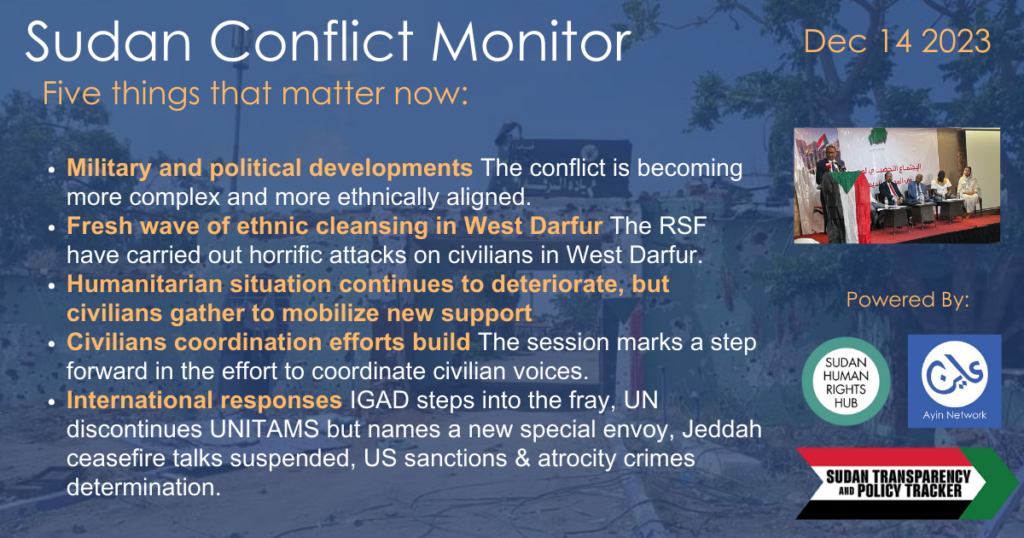
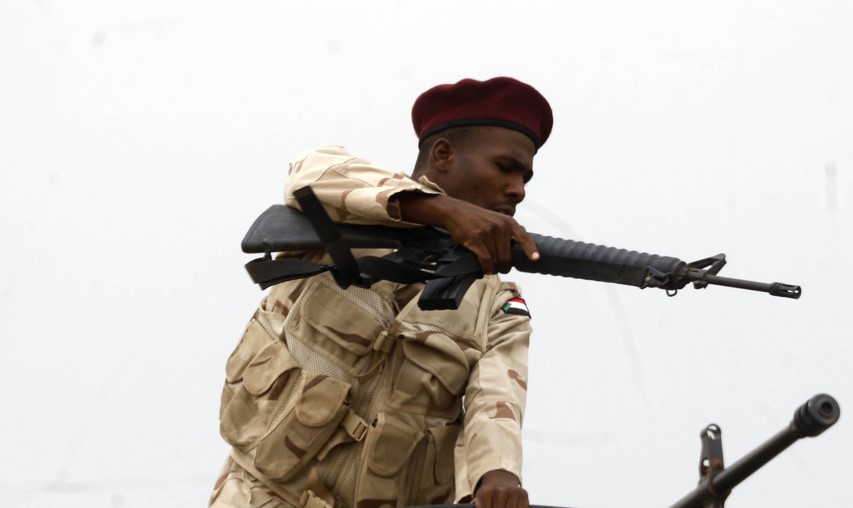
1. Military and Political Developments
As a recent STPT policy brief warned, the conflict in Sudan is becoming more complex, metastasizing into multiple localized conflicts not under the control of the central command of either the SAF or the RSF and increasingly drawing on ethnically and tribally oriented rhetoric on both sides. This is especially evident in Darfur.
- The RSF is now in control of most of Darfur. On November 22, the RSF took over the 20th Infantry Division El Daein, capital of East Darfur State, without major hostilities, following its take-over of SAF’s headquarters in El Geneina, Zalengi, and Nyala. In a significant departure from its record in West Darfur, and to a lesser degree elsewhere in the region, the RSF spared the city the plunder and widespread civilian killings – likely reflecting that El Daein is the center of the traditional homeland of the Rezeigat, from which the RSF draws much of its rank and file. This leaves El Fasher, the historic capital of Greater Darfur, as the only city not fully controlled by the RSF.
- On November 16, Finance Minister Gibril Ibrahim and Darfur regional governor Minni Minawi announced that the Darfur armed movements that signed the 2020 Juba Peace Agreement (JPA), particularly their own Justice and Equality Movement (JEM) and Sudan Liberation Movement (SLM/MM) factions, renounced their neutrality and were poised to fight alongside the SAF in the anticipated battle for El Fasher. The two justified their decision by citing the string of atrocities committed by the RSF since the beginning of the war, and alleged plans by the RSF to establish territorial control extending from Sudan deep into the Sahel region. Minawi later backpedaled. Other JPA signatories have not followed suit. El-Tahir Hagar of the Gathering of Sudan Liberation Forces (GSLF) and El-Hadi Idris of the SLM-Transitional Council pledged continued neutrality, although a spokesperson for the GSLF warned that RSF attacks on civilians in El Fasher could trigger the movement’s intervention. The JEM faction led by Suliman Sandal also vowed to remain neutral. The Sudanese Alliance of the late West Darfur Governor Khamis Abbakar had earlier fought and lost alongside the SAF in El-Genina, the SPLM/A faction led by Malik Agar remains a firm ally of the SAF, while the SPLM/A “Third Faction,” also known as Tamazuj, has field commanders with various loyalties. The non-signatory forces of the SLA faction led by Abdel Wahid el-Nur have meanwhile deployed in El Fasher to protect civilians and have sought to expand their presence elsewhere in the region, without taking sides.
- The allegiances of the various armed groups are more likely to rest with the field commanders, contingent on their assessment of the balance of power between the SAF and the RSF on the ground and narrower considerations of benefits that could be made by siding with the RSF. On November 16, RSF circulated a statement saying it would conduct joint patrols to protect civilians, and humanitarian convoys, and contain attempts to destabilize the region.
Meanwhile, pro-SAF media postings have been calling on Chadian army personnel to rebel against the use of the eastern airport at Um-Jaras as a staging platform for smuggling alleged UAE military assistance to the RSF.
- In mid-November, a tribal conflict between the Habaniya and Salamat of South Darfur caused dozens of casualties in the lead-up to and during the storming of Buram, the seat of the Nazir, or paramount chief, of the Habaniya. Both sides came fully equipped for the fight, with their RSF-issued fatigues, vehicles, and formidable weapons, and their clashes displaced thousands.
The fighting came hardly a week after the RSF commanders brokered a “cessation of hostilities agreement,” which paves the way for a tribal reconciliation conference in a few months and is emblematic of how the conflict could further fragment.
There is more that unifies the Salamat, Habania, and Beni Halba than separates them. The three groups self-identify as Arabs; they practice pastoralism, with high levels of settlement and intermarriage with local groups of African origin. All three groups have warrior traditions and many fight in the SAF and the RSF. They benefited from the Bashir-era policies of arming Darfur Arab tribes and accumulated impressive arsenals.
However, while the Habbaniya and Beni Halba have recognized traditional rights to homelands (dars) and traditional chieftains (Nazirs), the Salamat— who were the latest to migrate to, and settle in, Darfur— like the Mahriya, another main ethnic group within the RSF and from which its senior commanders hail, lack these, leading to significant grievances. Inter-Arab conflicts have been ongoing since the 1970s, driven by livestock rustling and competition over pastures, water resources, and farmlands. This made it easier for the Bashir regime to mobilize Arab groups against non-Arab groups during the regime’s genocidal campaign in Darfur in 2003 and beyond.
However, the regime also actively worked to divide Arab groups so that they would not become a threat to its hegemony. The very creation of the RSF in 2013 was intended to undermine the power base of Musa Hilal, chief of the Arab Mahameed clan, notorious commander of the Janjaweed and the Border Guards Corps (created by the army in 2006 to recycle the Janjaweed away from the world’s attention). The move empowered landless pastoralist groups such as the Mahriya and the Salamat against their better-endowed ethnic kins of South Darfur.
Today’s SAF war propaganda and psychological warfare are reminiscent of Bashir era manipulations of ethnicity. SAF propagandists celebrated these deadly clashes as a way to empty Khartoum of large numbers of RSF fighters who rushed back to support their respective communities in the localized confrontations. The local strife forced the RSF’s senior command to scramble to mediate traditional cessation of hostilities agreements within its constituencies.
In Khartoum, fighting continues. On November 11, the SAF and RSF traded accusations over the destruction of the Shambat bridge. Since the bridge is a vital supply and reinforcement route for the RSF, SAF was likely responsible. In response, the RSF launched a lightning offensive the following day against the Jebel Aulia Dam in the South of Khartoum, which has a one-lane road on top linking Khartoum and Omdurman. By November 20, RSF had seized Jebel Aulia, its military bases, and the dam. SAF said it had launched intense air attacks on the RSF’s newly acquired positions.
On December 2, an SAF drone attack broke the makeshift replacement bridge that the RSF rapidly constructed to re-establish its troops’ movements from Khartoum to Omdurman. The SAF’s reliance on air power and long-range artillery to dislodge the RSF from Jebel Aulia increases the risk of an accidental breach of the dam, which would expose the Sudanese capital to catastrophic flooding and put residents who did not flee the war at risk as well as the operations of the Merowe Dam in Sudan and the Aswan High Dam in Egypt.
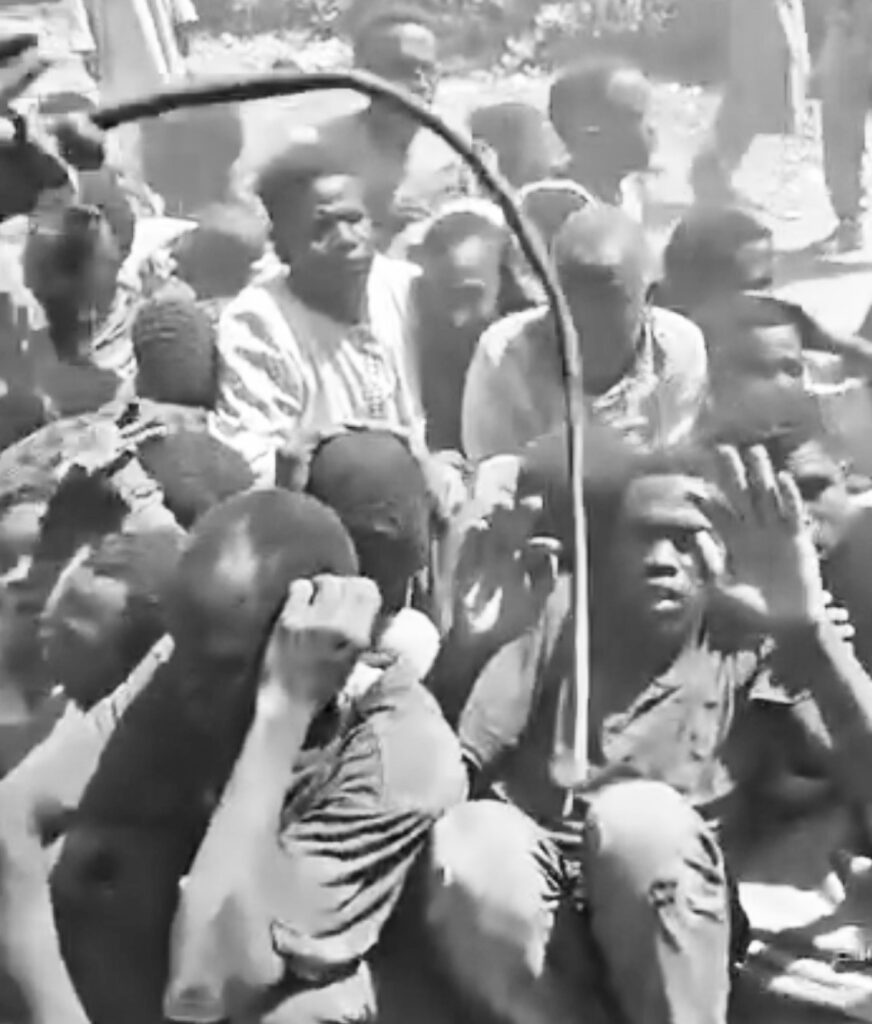
2. Fresh Wave of Ethnic Cleansing in West Darfur
Starting November 1, the RSF launched an offensive on Ardamata, near El Geneina. After taking over the SAF base on November 4, the forces turned on civilian areas including in the IDP camps and the area east of Kubri. According to accounts of those who fled, the RSF shelled and went house to house arresting civilians, demanding to know the whereabouts of weapons and “comrades” (meaning SAF-aligned armed groups), looting extensively, and burning some homes.
Many survivors described to researchers who visited eastern Chad (and contributed to this newsletter) how the forces rounded up civilians, separating the males and forcing them to lie in rows on the ground where they sprayed bullets randomly, injuring and killing at will. In one harrowing account, a young man was left for dead under a pile of bodies and managed to escape after civilians found him still breathing. Some reported being abducted by RSF or Arab militia and forced to carry looted items to their vehicles or do agricultural work or other physical labor – including burying dead bodies.
According to credible sources, hundreds of mostly-Masalit males were killed. Estimates range from 800 to 2,000. A local official reported that most of those killed had already fled previous RSF attacks in El Geneina in May and June. Thousands fled to Chad or El Geneina or elsewhere in Sudan. Many of those who fled were reportedly attacked by the RSF as they fled, or forced to pay fines to leave.
Survivors told other researchers, including Human Rights Watch, that Lt. Gen. Abelrahim Hamdan Dagalo, the RSF deputy commander and brother of Hemedt, was present in Ardamata at the time of the attack. An RSF video dated November 4 shows him celebrating with his forces after taking the SAF base, alongside Gen. Abdelrahman Juma’a who was re-appointed RSF’s commander in West Darfur. Juma’a was sanctioned by the US in June. Survivors also pointed to the acting governor of West Darfur and several local Arab leaders as responsible for the attacks.
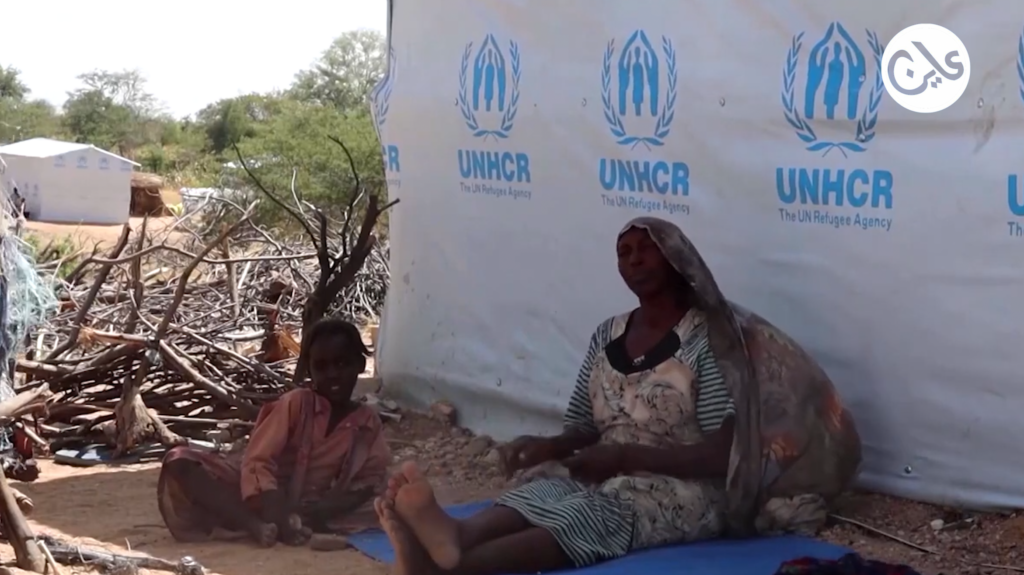
3. Humanitarian situation
The humanitarian situation in Sudan is continuing to deteriorate, with the UN warning of a lack of food for Sudanese refugees in eastern Chad and major health crises continuing in other parts of the country. In the words of Will Carter, Country Director of the Norwegian Refugee Council, “It’s a bleak situation. And, to be honest, we’re bracing for it to get worse next year. Famine is not off the table. There are some of the worst types of atrocities being committed and very little to contain them and a collapsing state, [making] health care, education systems but also even basic banking unlikely.” Although a recent ICP report does not predict famine before February 2024, it does predict that 17.7 million people will face acute food insecurity. The Food and Agriculture Organization has predicted a fall in the output of millet, a staple crop, by 50% due to reduced planting and a lack of agricultural inputs. Overall, the humanitarian response remains grossly underfunded.
In addition, humanitarian action is threatened by serious security threats, exemplified by the attack on an International Committee of the Red Cross convoy in the Al-Shajara neighborhood of Khartoum. The humanitarian convoy, clearly marked with the Red Cross emblem, was carrying out an operation to evacuate vulnerable people – including children, the sick, and the elderly. The Red Cross reported that despite coordination of the effort with the parties, the convoy was attacked on entering the area, killing two and injuring seven, including three ICRC staff members.
In response to the dire humanitarian crisis and obstacles the belligerents deploy to hinder access to life-saving assistance, the Sudanese have embarked on major efforts to draw attention to the country’s humanitarian needs. On November 18-20, 2023, the Sudan Humanitarian Crisis Conference in Cairo brought together several Sudanese CSOs and frontline responders with international NGOs like the Norwegian Refugee Council and the UN. The session was intended to build connections and continue assistance and activism going forward.
The conference, convened by Fikra Foundation, was completely civilian-led and excluded all partisan actors to ensure the focus remained on humanitarian issues, says Dallia Abdelmoniem, one of the conference organizers. The conference largely focused on the local humanitarian operations of the Emergency Response Rooms (ERRs) – youth-driven humanitarian initiatives often made up of former resistance committee members that voluntarily support the war-affected across the country. The conference represented the first time that many international aid organizations met the ERRs face-to-face and helped develop a new localized aid strategy. However, according to conference participants, international support for these community-based aid operations has not been forthcoming since structures to handle fiscal transfers, among other mechanisms, are not in place. Despite pledges by international aid agencies, financial aid to the ERRs has been negligible – the ERRs have received less than a million dollars from the international community since the conflict started and this support has largely come in the past two months, participants said.
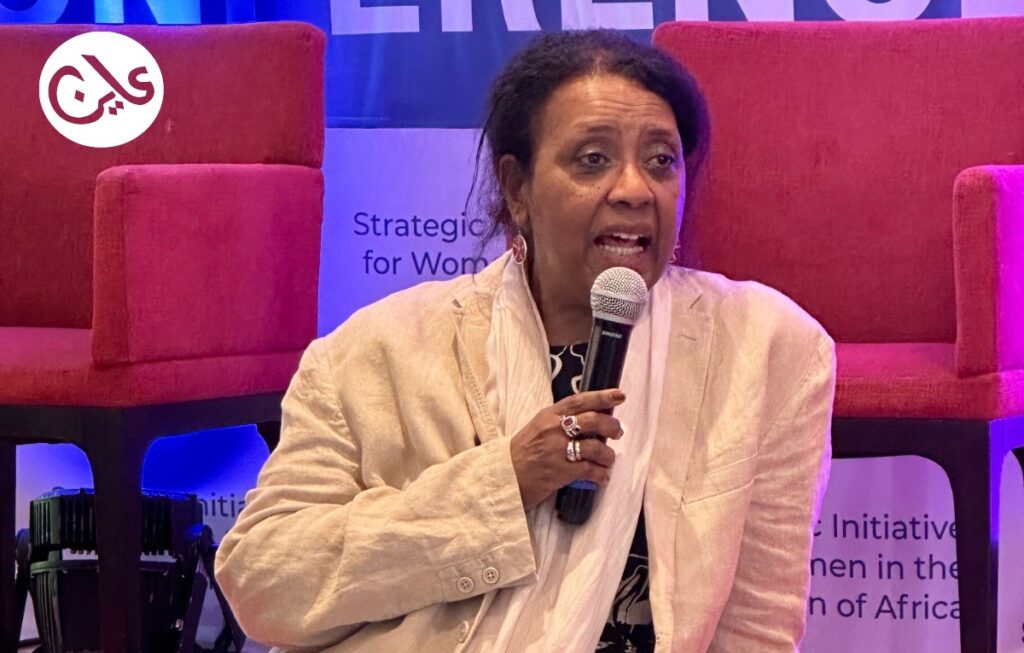
4. Civilian organization efforts build
At the October 23-26 conference of Sudanese civilians the Coordination of Civil Democratic Forces (Taqaddum). On November 8, this initiative took note of the commitments made in Jeddah and called for the representation of civilian forces in humanitarian coordination mechanisms, for more support to local civil society, and accountability. In early December, former Prime Minister Abdalla Hamdok wrote to UN Secretary-General Guterres, calling on him to renew the mandate of the UN Mission in Sudan, UNITAMS, despite government efforts to derail it.
Meanwhile, in another effort, the “Feminist Peace and Solidarity Conference: Women Leading Peace,” held on November 22-23, 2023, brought together over 140 participants. The participants included front-line women’s rights defenders in Sudan, with regional and international actors. The conference included powerful reminders of the situation on the ground. Actors read out testimonies from survivors of sexual violence gathered by SIHA, bringing these stories to life. Grassroots activists working on documenting these cases and providing services described the challenges that they face, including stories of personal attacks and being forced to flee.
Against this backdrop, activists from elsewhere in the world spoke out about their experiences in promoting and defending women’s rights in conflict situations, from Nigeria to Sierra Leone to Iraq, to exchange ideas and find ways of working more effectively. In addition, high-level panelists such as Hannah Tetteh, UN Special Representative for the Horn of Africa, spoke, drawing attention to how women activists can get more out of the international system.
The women gathered at the conference developed an outcome statement highlighting eleven demands to national, regional, and international actors to improve the response to the crisis in Sudan and, in particular, to alleviate the suffering of Sudanese women.
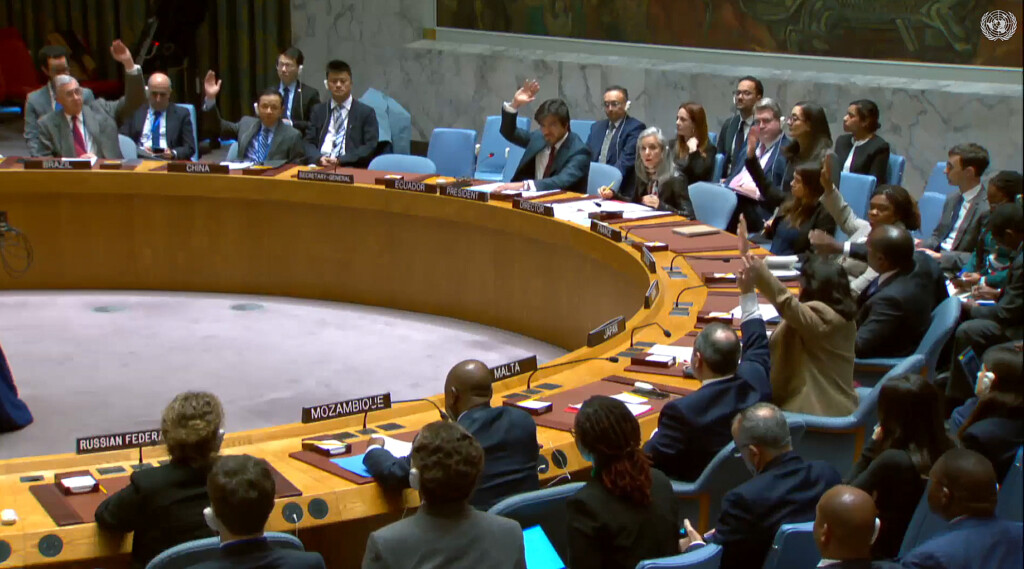
5. International responses:
- IGAD Stepping into the Fray
The IGAD 41st Summit held in Djibouti on December 9 charted a path for a peace process beyond the conclusion of a humanitarian ceasefire that Saudi Arabia and the US, the facilitators of the Jeddah process, pursued. The regional Heads of State made forceful calls for an immediate cessation of hostilities, unhindered humanitarian access, and protection of civilians. They committed to facilitating an inclusive civilian political process that would determine Sudan’s post-war political dispensation. The IGAD endorsed the report submitted by Kenyan President William Ruto, and chair of its Quartet of heads of states that it mandated to lead the IGAD’s intervention in resolving the crisis in Sudan. IGAD appointed a Special Envoy to assume that task, apparently in an attempt to resolve the stalemate created by Sudan’s strong objection to Ruto’s chairmanship of the mechanism.
According to the Communique issued by the IGAD’s Secretariat, both Lt.-Gen. Burhan, who was present in the meeting, and Lt.-Gen. Hemeti, who spoke to some of the presidents and IGAD officials remotely, committed to an unconditional ceasefire and agreed to have a one-on-one meeting, in addition to accepting IGAD’s facilitation of the civilian-led political process.
News from Djoubouti raised cautious optimism that the IGAD-led new structures and process might help achieve the end to the fighting that eluded the Jeddah platform. However, a statement from the Ministry of Foreign Affairs dashed these hopes by challenging the accuracy of IGAD’s communique in conveying what Burhan had agreed to, in addition to other objections on technical grounds. The Foreign Ministry previously contradicted Burhan’s agreement in a September meeting with the UN Secretary-General for an extension of UNITAMS mandate by demanding an immediate termination of the mission in a November letter to the UN. The about-face in both instances indicated for many the dual nature of the command of the SAF and what remained of the state which is believed to be driven from behind by stalwarts of the Islamist movement and Bashir regime.
- The UN discontinues UNITAMS but names a new special envoy
On November 21, 2023, the UN Secretary-General appointed a new representative of Sudan, Ramtane Lamamra. Amidst talk about the drawing down on the UNITAMS mission, Lamamra’s appointment highlighted the need for mechanisms for continued engagement with the country. It is not clear what level of staffing will support him, however, it would make sense for the Personal Envoy to draw on the expertise developed by the political division of UNITAMS. The Office of the Special Envoy is expected to be located in Addis Ababa where Lamamra’s distinguished role in building the AU could help in streamlining and better coordinating the multiple mediation efforts at hand.
The Secretary-General also appointed Ian Martin to lead a strategic review of the UN Mission in Sudan in November. The appointment came in response to the express agreement that Lt.-Gen. Burhan conveyed to the Secretary-General in their bilateral meeting during the UN General Assembly session in September. Burhan agreed then to a technical rollover of the mandate of the mission when it comes to renewal in December and a strategic assessment to adapt the mission’s mandate to the country’s evolving circumstances. The mid-November letter by the Sudan’s Foreign Minister informing the UN of Sudan’s termination of the mission “with immediate effect” came therefore as a surprise both to the Secretariat and Sudan’s permanent representative to the UN who was working with UN counterparts at the time on the details of the rollover. It is not clear what the fate of the strategic review missions will be now that the UNSC has decided to end UNITAMS’ mandate in response to Sudan’s foreign ministry demand. In the meantime, the withdrawal of the mission draws questions about the protection of civilians. “The need for protection of civilians is greater than ever,” says Human Rights Watch researcher Mohamed Osman.
- Jeddah Ceasefire Talks Suspended
In addition, the talks in Jeddah, which had resumed in October with limited expectations, have again been indefinitely suspended by early December after failing to make progress. Nonetheless, the Jeddah Facilitators secured the belligerents’ agreement to participate in a joint humanitarian mechanism led by the United Nations Office for the Coordination of Humanitarian Affairs (OCHA) in Sudan, to resolve the many obstacles that hinder the flow of aid to the millions who need it. The parties pledged to appoint focal points to help with the safe passage of humanitarian supplies and personnel.
Scheduled to take place in mid-December, the first meeting of the Jeddah Humanitarian Forum was delayed to early January, indicating a lack of sense of urgency by the parties. The Forum’s primary focus will be the facilitation of aid deliveries, medical services, and civilian protection. In addition, the Jeddah Facilitators, OCHA and other UN Humanitarian agencies, and other international and regional actors with influence in Sudan must press the belligerents to extend the Forum’s core mandate to include the facilitation of the extension of other essential services vital to the survival and wellbeing of the population. These include public health and education services that have all but come to a standstill in half of the country controlled by the RSF. The parties should also allow the crossline delivery of agricultural inputs to farmers in western Sudan.
The parties failed to honor their promises of de-escalation and engaging in confidence-building measures. On the contrary, hostilities and the resulting human and economic costs continued to rise dramatically in November and December. The Jeddah talks failures led the US Congress and members of the State Department to consider a new approach by targeting countries that are supplying arms to the combatants.
- New US sanctions & atrocity crimes determination
On December 4, the US sanctioned an additional three individuals Mohamed Atta Emoula Abbas, Taha Osman Ahmed Al-Hussein, and Salah Gosh. These are former regime officials understood to be behind maintaining the war. Two days later, the US government issued a statement that determined the RSF and SAF are committing war crimes in Sudan and that members of the RSF and allied militias had committed crimes against humanity and ethnic cleansing. The statement, however, was not accompanied by any policy so the impact of the determination is, at least currently, negligible.
More from our partner organizations:

Sign up for the Sudan Transparency and Policy Tracker newsletter here
- Field Dispatch from El Fasher November 2023
- Declaration of Principles Group & the Alliance of Democratic Civil Forces for Ending the War and Restore Democracy (Taqaddum) November 2023
- Sudan’s Banking System: Challenges and Opportunities October 2023
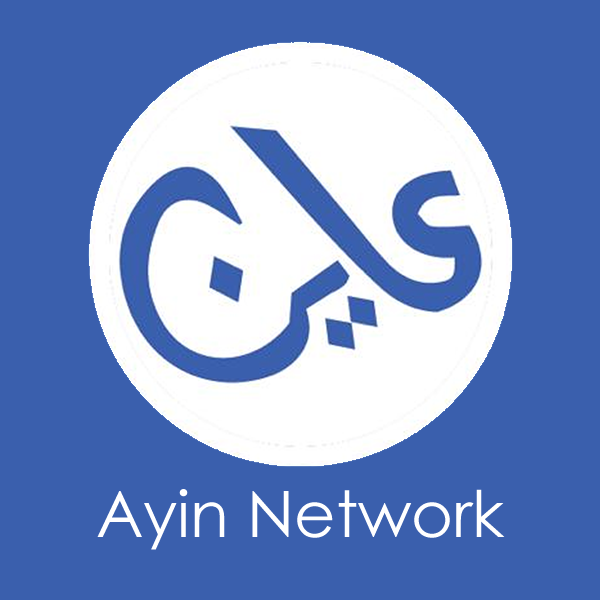
Follow Ayin: YouTube Facebook Twitter
- Jawahir’s story December 2023
- Al Kasaba – the looters and the RSF December 2023
- The UN Mission in Sudan ends as Jeddah peace talks end in deadlock, December 2023


